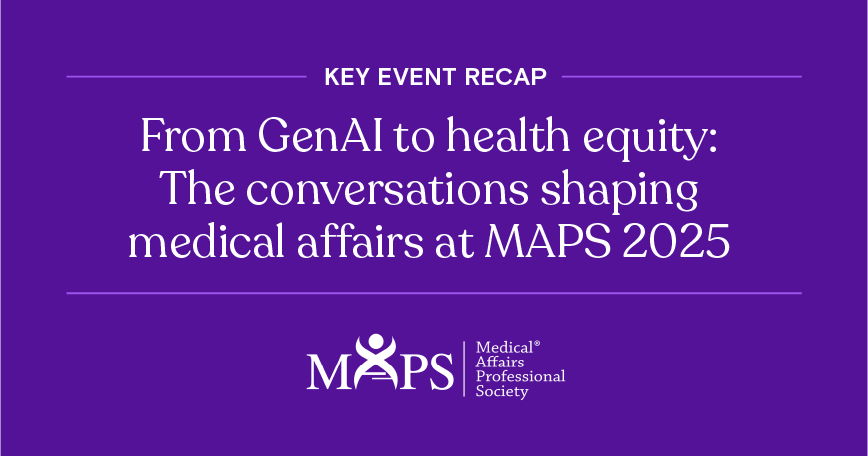From GenAI to health equity: The conversations shaping medical affairs at MAPS 2025
May 2nd, 2025

New Orleans hosted this year’s MAPS Americas Conference, where more than 1,500 medical affairs leaders gathered for a deep dive into the forces reshaping the function. Over several days, the field’s brightest minds discussed everything from the rise of GenAI to the push for health equity. Definitive Healthcare was proud to join that conversation, leading a session on how data is reshaping KOL engagement in the real world.
Couldn’t attend? Here’s what we learned from the sessions rethinking what medical affairs can and should be.
GenAI in medical affairs: Buzzword or breakthrough?
Generative AI isn’t new, but its impact on medical affairs is finally getting real. At MAPS 2025, leaders from Pfizer, Merck, and Astellas broke down how GenAI is moving from theory to practice inside pharma organizations.
Medical affairs leaders shared how teams are using GenAI to streamline medical inquiry responses, surface insights from field interactions, and reimagine content creation at scale. But it’s not all smooth sailing as issues around quality, oversight, and ethical guardrails loom large.
For example, as AI generates medical content, ensuring the output aligns with guidelines and remains scientifically accurate presents a challenge, especially when algorithms may not fully capture the nuances of medical information.
The bottom line? GenAI isn’t replacing the human touch in medical affairs, but it’s definitely rewriting the playbook. For attendees looking to build or refine their AI roadmap, this session delivered both inspiration and a healthy dose of caution.
Small biopharma, big launch goals: Making medical affairs work when resources are tight
Launching a new drug is tough — doing it without big pharma budgets? That’s next-level. In one workshop, speakers from Travere, X4 Pharmaceuticals, and Two Labs Pharma Services laid out what it really takes to build and lead medical affairs in a resource-constrained environment.
The speakers didn’t sugarcoat the challenges. Smaller teams often juggle limited headcount, compressed timelines, and colleagues with varying levels of understanding about the value and role of medical affairs. But they also framed constraints as a catalyst for sharper focus: prioritizing what actually matters.
From redefining launch roadmaps to building smart cross-functional partnerships, the message was clear: you don’t need a Fortune 500 budget to make a big impact at launch time.
Another takeaway was knowing when to buy, what to buy, and when to hold off. In a resource-limited environment, every tech dollar has to earn its keep. For scrappy medical affairs teams, this session delivered a pragmatic blueprint for punching above their weight.
Making health equity matter in medical affairs
Health equity doesn’t get the attention it deserves, and medical affairs is working to change that. A workshop on the topic challenged attendees to rethink medical affairs not just as a scientific function, but as a strategic driver of more equitable healthcare.
The session pulled no punches: disparities in care aren’t just persistent, they’re widening. From socioeconomic barriers to systemic gaps in access and education, the issues are complex and deeply rooted. But as pharma evolves from product providers to health system partners, medical affairs has a unique opportunity to drive equity within and between systems.
The path forward is clear: Close critical gaps in awareness, education, evidence, access, and quality through deep collaboration across functions and with healthcare stakeholders at every level. Ultimately, delivering on health equity isn’t just about programs or metrics. It’s about embedding equity into the DNA of how medical affairs operates. And that shift is already underway.
Tailored, not generic: Rethinking HCP education for a noisy world
In an era where information is endless and attention is scarce, one-size-fits-all messaging doesn’t cut it anymore. A workshop called “Giving Your Audience What They Want: Mastering Personalized Education for HCPs” tackled a critical question: how do you cut through the noise and actually deliver information that supports HCP decision-making?
The speakers offered a hands-on look at building data-driven, hyper-relevant education strategies for today’s diverse HCP audiences, from hospital pharmacists to pathway medical directors. The session focused on understanding audience channels and content preferences, because knowing your audience inside and out is the key to crafting content that supports clinical decision-making.
And the takeaway was clear: personalized education isn’t just a nice-to-have. It’s a competitive advantage in shaping HCP behavior and ultimately influencing patient outcomes.
KOLs, rewritten: How data is reshaping influence strategy
Early morning or not, the energy was dialed up as Definitive Healthcare took the stage to break down one of the industry’s most pressing questions: how do you really know who’s influencing whom? Gone are the days when publications and trial rosters told the full story. Today, it’s all about real-world KOL influence and the data behind it.
In this session, our team, alongside IPG Health Medical Communications, showed how AI, machine learning, and unstructured data are flipping the script on traditional KOL tracking and engagement. From prescribing patterns to digital footprints, the discussion centered on how pharma teams are using more nuanced analytics to surface the right voices, understand shifts in influence, and connect with the most relevant experts.
For medical affairs and MSL teams, the takeaway was clear: smarter KOL engagement isn’t about working harder, it’s about working with better signals. And with the right data, those signals are clearer than ever.
The bottom line: Rethinking what medical affairs can be
Across sessions, a few themes kept surfacing: do more with less, build smarter (not just bigger), and put people — whether patients, field teams, or cross-functional partners — at the center. From using GenAI responsibly to advocating for health equity, MAPS 2025 wasn’t just about where medical affairs is today, but where it needs to go next.
If the buzz in New Orleans is any indication, that future’s already taking shape, and it’s bold, collaborative, and anything but business as usual.
Curious how Definitive Healthcare can help you lead the way? Sign up for a free trial to start building relationships with the right global scientific and clinical experts.



